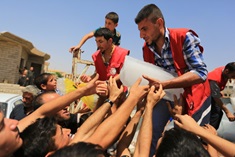The Dangers of Humanitarianism

The use of the politics of humanitarianism to degrade humans into bodies that are viewed as less than human in France is not something that I previously considered. The dangers of humanitarianism entering the political realm are explored through Miriam Ticktin’s ethnographic study. In her study, Ticktin explores the consequences in a shift from human rights regimes to humanitarianism regimes. The illness clause gives the power to the state to draw a line between deserving and undeserving migrants while reinforcing hierarchies which place native French persons on top. The greatest danger in humanitarian effort entering the political sphere, I would say, is the intention by which it does so. Humanitarian efforts work in a way to benefit others but often in their narrow vision of who needs the aid, for example the ill in France, they fail to acknowledge those that fall outside of the realm of this category. By creating a system of deservingness which places ill migrants at the top, it fails to neglect those who migrant due to poverty. Due to the fact that humanitarian effort is often viewed as being helpful, the negative effects or other causes of migration are ignored in favor of the state appearing as if they are altruistic and aiding those that need the help the most. By reinforcing illness as a biological signifier it causes the migrant to chose whether to be defined by their illness, excluding them from the social communities by which they belong. The illness clause causes migrants to choose to suffer from exploitation, exclusion, and poverty, or to suffer from illness. The power of humanitarianism in the political sphere allows the state to create a system of un/deservingness where those who are ill become political subjects, with limited political choices. In this way the state can control and limit the freedom of migrants while exhibiting traits of altruism.
Recent Comments